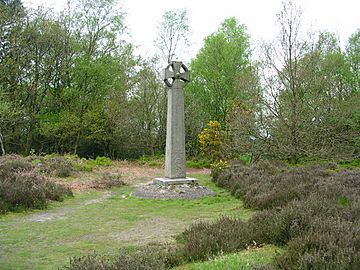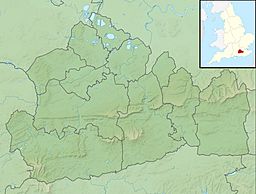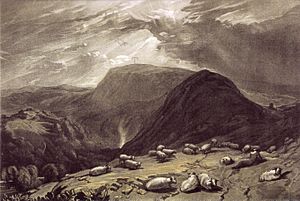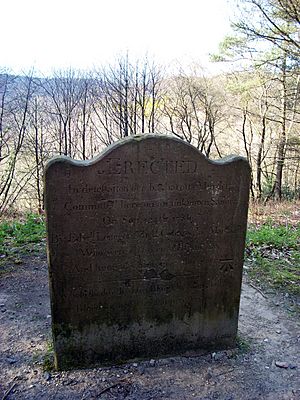Gibbet Hill, Hindhead facts for kids
Quick facts for kids Gibbet Hill |
|
|---|---|

The Celtic Cross
|
|
| Highest point | |
| Elevation | 272 m (892 ft) |
| Geography | |
| Parent range | Greensand Ridge |
Gibbet Hill is a famous hill located in Hindhead, Surrey, England. It's known for being the highest point around the Devil's Punch Bowl, a large natural valley. You can find it not far from the main A3 road that connects London to Portsmouth.
Contents
Exploring Gibbet Hill's Geography
Gibbet Hill stands about 272 meters (892 feet) above sea level. It is the second highest hill in Surrey. Only Leith Hill is taller, by about 23 meters. Botley Hill is just a little bit lower, by 2.4 meters.
Amazing Views from the Summit
From the very top of Gibbet Hill, you can see a wide, beautiful view. This view is especially clear towards the north and east. Looking north, you can see the Devil's Punchbowl, Thursley, Hankley Common, and even Guildford Cathedral.
To the east, you can see the Sussex Weald, which is a large area of countryside. If you look south, you might spot the hills of Haslemere and Blackdown. On a very clear day, you might even see the skyline of London, which is about 40 miles (64 kilometers) away! This includes tall buildings like The Gherkin and Tower 42.
The White Horse of Combe Head
To the south of Gibbet Hill is Weydown Common. For many years, from at least 1909 to 1939, there was a large white horse carved into the hillside at Combe Head. This horse could be seen from Gibbet Hill. Today, the figure is covered by plants and can no longer be seen.
The History of Gibbet Hill
This area used to have a bad reputation because of highwaymen and robbers. These were people who would stop travelers on the roads to steal from them.
The Celtic Cross Memorial
The tall Celtic cross you see on Gibbet Hill is a special memorial. Some say it was put there by a judge named Sir William Erle. Others believe it was an unmarked memorial put up after he passed away.
The Broom-squire's Land
The land around Gibbet Hill is mostly heathland and gorse. In the past, this area was home to people called "broomsquires." They would collect plants like heather, broom, and birch branches. They used these plants to make brooms, which were very useful tools. Because of this, the area was sometimes thought of as a wild or "heathen" place.
A Famous Story: The Sailor's Stone
Gibbet Hill and the nearby area are mentioned in a famous book! Charles Dickens wrote about it in his 1839 novel, Nicholas Nickleby. In the story, the main character, Nicholas Nickleby, walks through this area on his way from London to Portsmouth.
Dickens was referring to a sad event that happened on September 24, 1786. An Unknown Sailor was traveling to his ship in Portsmouth. He met three men at an inn in Thursley and bought them drinks. Sadly, these men then followed him and murdered him in the Devil's Punch Bowl.
The criminals were quickly caught and brought to justice. They were punished for their crime at Gibbet Hill. The unknown sailor was buried in Thursley churchyard. A special memorial stone was placed on Gibbet Hill, close to where the crime happened, to remember him.
The story of the sailor also inspired another book. Sabine Baring-Gould wrote a novel in 1896 called The Broom-squire. In this book, the sailor's child is an important character. In 2000, a researcher named Peter Moorey suggested that the sailor's real name might have been Edward Hardman.
Plane Crash on Gibbet Hill
On May 6, 1945, a military plane crashed near Gibbet Hill. It was a Curtiss C-46 Commando (number 44-77839) from the United States Army Air Forces. The plane was flying in bad weather when it hit a radar tower and crashed. Sadly, all 30 people on board, including passengers and crew, died. One person on the ground was also killed in the accident.




